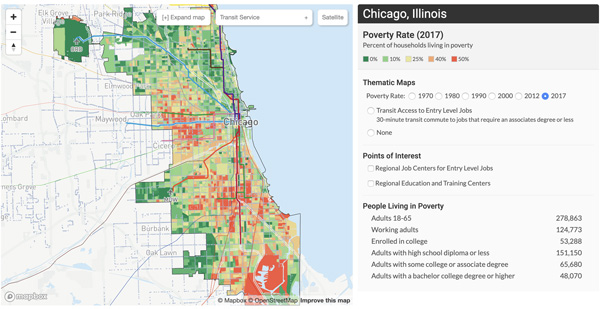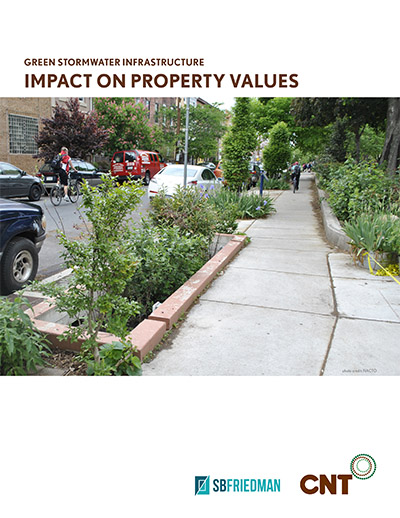
Suburbs Can Advance Economic Development and Equality by Adding Housing Near Transit
Chicago’s northern suburbs are falling short in efforts to capitalize on the economic growth potential of building mixed-income TOD, according to our latest report. The report, Quality of Life, (e)Quality of Place, wasreleased today by CNT and the nonprofit Open Communities. CTA and Metra stops anchor most north suburban downtowns. Quality of Life, (e)Quality of Place found that mixed-income housing in those downtowns can boost neighborhood property values,... Continue reading »
What’s the Secret Behind America’s Most Innovative Cities?
A recent CNN Money series showcased the most innovative cities in America. Chicago came in at #4, in part because “…[Chicago’s] Center for Neighborhood Technology has contributed to innovations on the local level, like car-sharing and energy efficiency in homes.” Wow. We’re honored! But wait, there’s more: CNT also had a hand in projects inMinneapolis and Cleveland, two more cities on the most innovative list. We’re very proud to see our work recognized on the national stage.... Continue reading »
Helping America’s Utilities Start Fixing the Leaks
CNT’s November 2013 report, The Case for Fixing the Leaks, offered a look at the disconcerting state of America’s water infrastructure. The report found that America’s pipes leak a whopping 2.1 trillion gallons of treated water every year. In a time when parts of the country have been facing record-setting droughts, protecting our drinking water supply is more vital than ever. The Case for Fixing the Leaks was only the beginning. Since releasing the report, our water... Continue reading »
Illinois Gubernatorial Campaigns Neglect Public Transportation
The November 4 Illinois gubernatorial election is just around the corner. While there are many important topics being debated, we’re hearing next to nothing about funding for improved and expanded public transportation. For CNT, our Transit Future campaign, and the nearly half a million Cook County residents stranded in transit deserts, this is a critical issue. Our Transit Future partner organization, Active Transportation Alliance, even went as far as to offer ... Continue reading »
New HUD Guidebook Offers Transportation Strategies for Small and Mid-Sized Cities
For the average household, transportation is the second-highest expense after housing. In large, dense cities, public transit availability can dramatically decrease transportation costs. But what about smaller places – quiet suburbs, rural communities, regional centers – that don’t have the same level of public transit service? How can leaders in these communities find ways to reduce transportation costs to help low- and middle-income residents get ahead? A recent HUD publication ... Continue reading »
Highway Boondoggles + The Illiana Expressway
I recently read the U.S. PIRG Education Fund’s excellent new report,Highway Boondoggles: Wasted Money and America’s Transportation Future. I couldn’t help thinking about the decision(s) looming in CNT’s backyard about the proposed Illiana Expressway. Highway Boondoggles focuses on the national and local mismanagement of funding allocated to highway construction projects and the negative economic, social, and environmental consequences that such boondoggles might have. The report reminds... Continue reading »
Bay Area Parking Calculator Finds $140 Million in Unused Spaces
Is there such thing as too much parking? For many Americans, the answer may be a quick “no.” But it’s actually not that simple. Overbuilt parking may not sound like much of a problem, but the average parking space can cost $20,000 to $80,000 to build. Since most cities dictate the minimum number of spaces that must be built at residential buildings (even in location-efficient places where people drive less and walk, bike, or take transit more) adding parking spaces adds to housing costs... Continue reading »
Urban Flooding Bill Introduced in Congress
Urban flooding impacts people and communities all over the country, damaging homes and businesses, and polluting precious water resources. To address this issue, US Representatives Mike Quigley (D-IL) and Peter King (R-NY) introduced the bipartisan Urban Flooding Awareness Act. This federal legislation is designed to help develop a clear-cut definition of urban flooding, and requires a comprehensive study of the personal and social costs of urban flooding in America. “Stronger, more... Continue reading »
CNT + Army Corps Collaborate to Help Cities Get RainReady
Urban flooding is a problem with a broad range of causes. The way neighborhoods are developed, the capacity of sewer systems, regional weather variations – all of these, and more, affect flood risk. This means it will take a diverse array of expertise to develop effective solutions to a community’s flooding problems. To start addressing flooding holistically, the Army Corps of Engineerscreated the Silver Jackets program to lead collaborative, interagency flood-risk management... Continue reading »
Legislation Will Help Make Illinois Water Infrastructure More Resilient
Governor Patrick Quinn signed into law today legislation that will help Illinois cities better prepare for the impacts of climate change. The Natural Resources Defense Council (NRDC) andCenter for Neighborhood Technology (CNT) worked with the legislature and with Governor Quinn’s administration to develop the legislation and worked to support the bill’s passage. The legislation, known as the Clean Water Initiative, provides much needed financial support for... Continue reading »





 Strengthening Transit Through Community Partnerships
Strengthening Transit Through Community Partnerships








